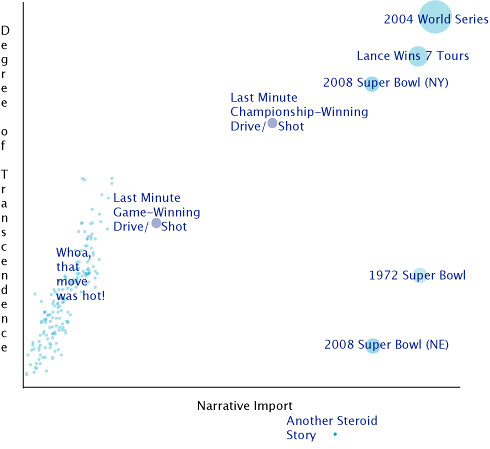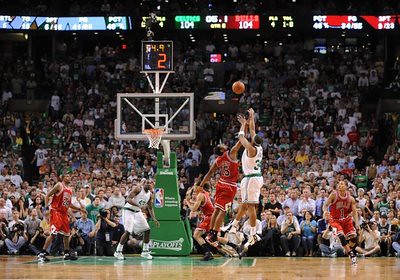"The true picture of the past flits by. The past can be seized only as an image which flashes up at the instant when it can be recognized and is never seen again. ‘The truth will not run away from us’: in the historical outlook of historicism these words of Gottfried Keller mark the exact point where historical materialism cuts through historicism. For every image of the past that is not recognized by the present as one of its own concerns threatens to disappear irretrievably. (The good tidings which the historian of the past brings with throbbing heart may be lost in a void the very moment he opens his mouth.)" -Walter Benjamin, On the Concept of History
"I am prepared for anything: KG pulling a Willis Reed, Jordan and Bird showing up, Rondo hitting John Salmons with a chair, Doc running the series-deciding play for Tony Allen, Kevin Harlan's head flying off his body, Tim Thomas experiencing a human emotion, you name it. That's the best thing about this series: Anything is possible. The ceiling hasn't just been removed, it's been obliterated.
Call it Game 7, call it Round 15, call it whatever you want. Just remember to call it the greatest first-round series ever played." -Bill Simmons, Chicago Bulls Boston Celtics Game 6 Diary
Sail To The Moon (Brush The Cobwebs Of The Sky)
There are sports events and there are sports Events. Transcendent moments for which "'we put up with every story about Clemens and Bonds and Michael Vick and Terrell Owens and everyone else who conspires to make sports less fun,"1 moments that form the frameworks of our fandom. As a cursory poke about our archives will tell you, one of the main reasons we feel sports in general is worth our emotional and intellectual engagement is that it provides "a bottomless well of compelling narrative."2 I'm going to go a step further here: I'll go ahead and posit that as far as our individual fandoms are concerned, sports events derive lasting significance almost exclusively from their narrative significance.3 This works on all sorts of scales. We use evolving mental narratives on various levels to define athletes, franchises, even entire sports. There are events and Events; there are transcendent moments and there are Transcendent Moments. I feel a hastily conceived, extremely biased chart coming.

1: Same Simmons piece. It is, I must say, enormously convenient to have such an invested, articulate Celtics fan around to quote, so long as he's not making "Godfather" references or talking about women.
2: While I have a few differences with Justice on the subject, they're more emphatic than thematic. Read his post, read the Run of Play series linked therein, we'll all high five, it'll be great.
3: This isn't incompatible with the other things Justice was on about earlier. It's different in the same way spending a whole season flipping on ESPN when you're channel surfing is different from spending a whole season flipping on ESPN when your team is on.
Karma Police
All of this mythologizing is an internal, personal process, but it's hardly unique and it doesn't happen in a vacuum. From the staid, journalistic AP recaps to deeply partisan hometown newspaper columns, there is a structure to the unfolding media discussions. A sort of teleological progression towards an interpretive narrative that grows more abstract and orthodox in proportion to the narrative power of its subject.4 Now, to a great extent this is just humanity doing its thing-- finding, applying, and adjusting broad patterns is one of the primary ways our brains interact with the world. But every so often it is good to be reminded that sports is "a business where developing, maintaining, defending, attacking, and manipulating broad narratives [is] an important tool of the trade." Controlling the story is vital; most teams would like to land the next David Axelrod almost as much as they'd like to land the next LeBron James, I'd imagine. But on the level of the individual fan, what this boils down to is that, unless you avoid journalism like the plague and only talk sports with a bloody-minded, manifesto-toting group of friends, discussions that deeply influence the narratives you will internalize are largely framed for you in broadcast media studios.
4: If this seems like a stretch, tell me: does anyone ever bother trying to claim that this was a low-percentage shot leading to a somewhat flukey win? Because it was.
Motion Picture Soundtrack
I became intensely aware of this process trying to follow the Celtics' postseason from New Zealand. Between the massive time zone difference and the NBA's peripheral status to a people in rugby's thrall, I was totally relegated to playing catch-up on the internet. YouTube highlights, recaps upon recaps, and a handful of blogs read religiously left me with all sorts of predigested data about the games: who got what statistics in how many minutes, what the key plays were and what they looked like, which coaching moves could be dissected and how, every bench player's contribution and so forth. But the aesthetic experience of watching a game of basketball was utterly stripped away. It was like being led around blindfolded instead of going for a walk. It was like reading Cliffs Notes. My rooting took on an edge of desperation-- if we could only advance far enough, ESPN Australia would have to televise all our games. As the first round series gathered steam, poring over the gobsmacked ebullience pouring out of damn near every corner of the internet dedicated to NBA ball became downright excruciating. Derek Rose matches Kareem's playoff debut scoring record while posting the second 35-x-10 postseason line in history and icing the winning freethrows in overtime. Meanwhile Rajon Rondo, a developing star in his own right and my favorite player to watch, holds his own in the point guard duel, going 29-9-7, and an exhausted Pierce comes up just shy of bringing home the bacon. And that was just game one. Then there were six overtimes in a three-game stretch. Game five happened:

And so did Game Fucking Six:
 5
5And acres of text flowed forth.
5: I chose this picture over Noah roaring like the ugliest lion for the same reason Time magazine chose Giuliani over Bin Laden as 2001's Man of the Year. Ray Allen was the FDNY.
How To Disappear Completely
Basketball moved on. The Celts put up another gutsy seven-game series, but couldn't put the hammer down on Orlando and went to their respective summer homes disappointed. And basketball moved on. Once the dust had settled, what was just as striking as the ecstatic tenor of the round one coverage was how there was no place in any of the sundry postseason retrospectives for "the greatest series you've ever seen in your entire life". Once the games are all over, well, the game changes. The serious fans know the score and have gone home. The only demographics paying attention are Lakers fans looking to wallow some in victory and The Casual Fan, a much easier creature to predict than, say, The Reader. The order of the day isn't really retrospection, it's hagiography. And so the Lakers' hiccup against the Rockets, while it was never compared to the handful of greatest series the Association has ever seen, was the early-round series of note, because it was vindicated by what came later. Past is prologue, and the Celtics-Bulls got left hanging, waiting for its book.
"Vindicated by what came later" also happens to mark the exact point where analysis starts turning into total speculation, which is kind of fun or sort of worthless, depending on how you choose to look at it. If The LeBrons' backcourt hadn't disappeared and they had pulled out some more games (and hell, if we're spotting Playoff Lyndon B. James some teammates playing well, we might as well just give them the title, too), how much more vital would this shot have been? If Bird and Magic had both pulled J.J. Reddicks, would the 1979 NCAA championships have transformed anything?
But let's go another direction with this idea that, recontextualized by what follows, events can change significance. The question at hand is not "what if?" but "what next?"
Jigsaw Falling Into Place
To second-guess the past is one thing; to second-guess the future quite another. There are simply too many variables at play. The core of this team could win anywhere from zero to two more titles6, and each scenario would cast things in a different light. Maybe it bypasses the franchise level altogether and becomes a touchstone in some players' creation myths. How bright can Rondo shine? How high can Rose rise, and how long will it take him to put it all together? Can Ray Allen pull out a few more big performances and officially pass Reggie Miller in the jumpshot pantheon?
I can't even pretend to guess with any vestige of authority, which, really, is sort of the point. Nothing kills a good story quite like predictability, after all. Simply pointing out the unknowability of the future is both obvious and played out, but beyond the next few times the Bulls and Celts meet up, who knows when and how this series will find relevance? All we can do is wait and see how things work out.

6: If we do manage to pull out two more, could Kobe deal with an asterisk the size of KG's knee next to His Championship?

No comments:
Post a Comment